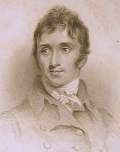Ye Mariners Of England: A Naval Ode
by Thomas Campbell
I.
YE Mariners of England!
That guard our native seas;
Whose flag has braved, a thousand years,
The battle and the breeze!
Your glorious standard launch again
To match another foe!
And sweep through the deep,
While the stormy winds do blow;
While the battle rages loud and long,
And the stormy winds do blow.
II.
The spirits of your fathers
Shall start from every wave! --
For the deck it was their field of fame,
And Ocean was their grave:
Where Blake and mighty Nelson fell,
Your manly hearts shall glow,
As ye sweep through the deep,
While the stormy winds do blow,
While the battle rages loud and long,
And the stormy winds do blow.
III.
Britannia needs no bulwarks,
No towers along the steep;
Her march is o'er the mountain-waves,
Her home is on the deep.
With thunders from her native oak,
She quells the floods below, --
As they roar on the shore,
When the stormy winds do blow:
When the battle rages loud and long,
And the stormy winds do blow.
IV.
The meteor flag of England
Shall yet terrific burn;
Till danger's troubled night depart,
And the star of peace return.
Then, then, ye ocean-warriors!
Our song and feast shall flow
To the fame of your name,
When the storm has ceased to blow;
When the fiery fight is heard no more,
And the storm has ceased to blow.
1800.
This naval ode was written at Altona, in the winter of 1800, when the poet was twenty-three years of age; it appeared first in the Morning Chronicle with the following title, Alteration of the old ballad 'Ye Gentlemen of England,' composed on the prospect of a Russian war,
and signed, Amator Patriæ.
At this time the South Eastern and Southern coasts of England were first fortified with martello towers as a defence against foreign invasion; to this fact reference is elegantly made in the lines
Britannia needs no bulwarks,
No towers along the steep.
The subject was first suggested by hearing the air of the old ballad before mentioned played at the house of a friend in Scotland; and when the rumour of war with Russia became a general topic of conversation among the British at Altona, it aroused Campbell's patriotism, and hence the result in verse.
Source:
The Poetical Works Of Thomas CampbellCopyright 1866
Little, Brown, And Company, Boston
